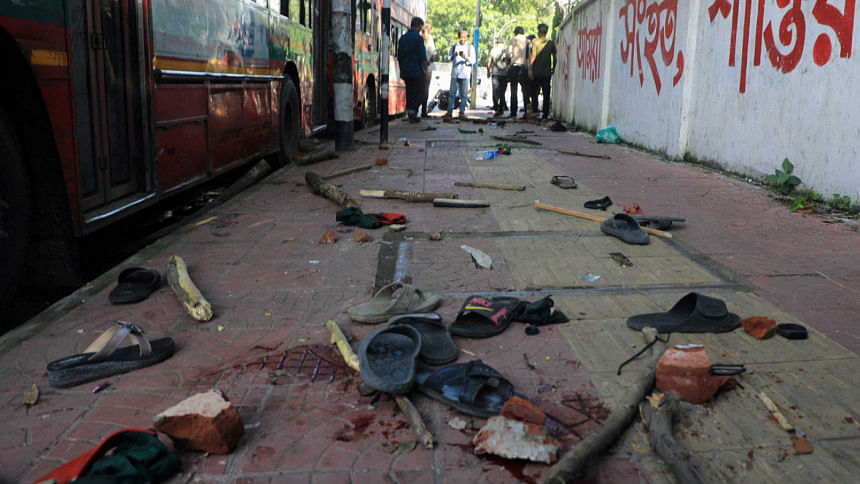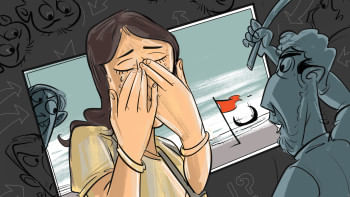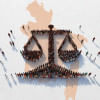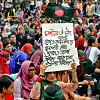Prosecuting the perpetrators of July-August massacre: A case for restorative justice

Just a month and a half ago, Bangladesh witnessed abominable atrocities and mass killings perpetrated by Sheikh Hasina's fascist regime. In response to these grave human rights violations, the interim government has initiated the International Crimes Tribunal (ICT) to prosecute Hasina and her government for ordering the killings between July 1 and August 5. In this context, it is essential to reflect on the utility of a criminal tribunal and reconsider whether prosecution alone constitutes justice. While punishing the key perpetrators of mass killings is indeed an essential component of transitional justice, other crucial aspects of justice must also be considered, particularly from the perspective of restorative justice.
International crimes tribunals are usually based on punitive frameworks that seek justice through the prosecution of those involved in mass killings or war crimes. Although the International Criminal Court (ICC), established by the Rome Statute, incorporates both punitive and rehabilitative elements, it has been criticised for its lack of meaningful victim participation, reparation, relational restoration, and healing. This gap has led to the development of the Truth and Reconciliation Commission (TRC) grounded in the principles of restorative justice. TRCs recognise the importance of truth, accountability, reparation, relationship-building, reconciliation and healing in post-conflict societies—elements that are often missing in the adversarial and punitive justice systems of criminal courts or tribunals.
The restorative justice approach has gained growing acceptance in several post-conflict nations, including Canada, Rwanda, Cambodia and Sierra Leone, due to its holistic, participatory, empowering and empathetic approach to justice. With a focus on addressing the "social harm" caused by crime, restorative justice advocates for the involvement of all stakeholders in the justice process, promoting meaningful dialogue between victims and perpetrators instead of a simple "punitive blame allocation exercise." The truth and reconciliation process aims to uncover the truth about past atrocities, mend societal relations, and prevent future human rights violations. This justice mechanism is especially valuable in political contexts where victims and perpetrators often need to coexist in the same society, thus requiring a structural reform, rather than the mere criminalisation of one group.
In contrast, international criminal courts and tribunals have faced increasing criticism over the past decade for their narrow and decontextualised approaches to justice. The legal constraint on individual criminal accountability makes these institutions ill-suited to address the complexities of conflicts in Global South countries, which are often shaped by local or domestic actors. Additionally, punitive and adversarial forms of justice frequently result in polarisation, dominance of the victor's narrative, and ultimately unsustainable justice outcomes.
For instance, in Bangladesh, in addition to law enforcement officials, local goons, Jubo League and Chhatra League members, and local government representatives affiliated with the Awami League government played significant roles in perpetrating violence against the protesters in July and August. Therefore, punishing only a few state leaders or law enforcement officials while ignoring the local actors who enforced violence and intimidation within communities would be insufficient. Moreover, the conflict has already sown distrust, hatred and division among people who have witnessed members of their own communities participating in violence and killings. In such a context, punitive justice alone could further weaken community bonds, social cohesion, and peacemaking efforts. Hence, it is crucial to reconsider the ICT as the sole tool for justice and instead explore a more grounded and holistic approach to addressing these mass atrocities.
Bangladesh is an ideal candidate for a restorative justice approach if it seeks to establish accountability for the mass killings while fostering reconciliation, healing, and the reintegration of various societal stakeholders. The restorative approach offers victims a diverse range of justice outcomes, including reparation, healing and empowerment—outcomes that are absent from criminal prosecutions alone. According to recent reports, as many as 875 people have been killed and over 30,000 injured during the quota reform movement and the subsequent student-led mass uprising. A key component of justice lies in ensuring reparation and restitution for these victims, which is just as important as criminal prosecutions. Under a restorative justice model, community reparative boards could be established to address the diverse needs for reparation and compensation of the victims.
Additionally, Bangladesh's genocidal past and the failure of the ICT to punish war criminals in an uncontroversial manner have long fuelled political tensions, civil unrest, and polarisation. Over the years, the Awami League government has constructed a linear political narrative, forcing people into a dichotomy of either supporting the party as the champions of independence or being branded as Razakars (traitors). This political culture of intolerance, polarisation and discrimination has not only marginalised a significant portion of the population, but is also one of the main drivers of the anti-discrimination movement. Therefore, it is imperative to adopt a justice mechanism that does not exacerbate existing fault lines, but rather fosters amnesty, reconciliation, and healing within the country. Because of that, while the restorative justice approach may be new to Bangladesh's justice landscape, it is worth serious consideration.
Dr Muhammad Asadullah is associate professor in the Department of Justice Studies at the University of Regina.
Nousheen Sharmila Ritu is a PhD student in the Faculty of Law at the University of Warwick.
The views expressed in the article are the authors' own
Follow The Daily Star Opinion on Facebook for the latest opinions, commentaries and analyses by experts and professionals. To contribute your article or letter to The Daily Star Opinion, see our guidelines for submission.

 For all latest news, follow The Daily Star's Google News channel.
For all latest news, follow The Daily Star's Google News channel. 










Comments